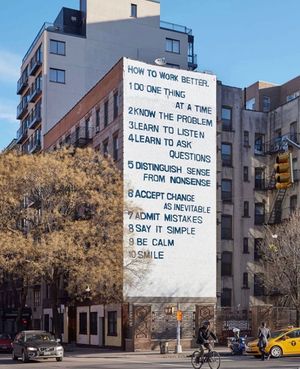June 13, 2020: Difference between revisions
m (Added page #.) |
(Changed intro.) |
||
| Line 2: | Line 2: | ||
[[File:20200610-memes 08.jpg|thumb]] | [[File:20200610-memes 08.jpg|thumb]] | ||
I | I like these guidelines. They couple easily be a twenty-first-century replacement for that outdated [https://ffrf.org/component/k2/item/23730-what-s-wrong-with-the-ten-commandments other list of ten]. They call this list “How to Work Better,” but I renamed it above. | ||
# Do one thing at a time | # Do one thing at a time | ||
Revision as of 12:16, 15 June 2020
How to Live Better covid-19: day 92 | US: GA | info | act
I like these guidelines. They couple easily be a twenty-first-century replacement for that outdated other list of ten. They call this list “How to Work Better,” but I renamed it above.
- Do one thing at a time
- Know the problem
- Learn to listen
- Learn to ask questions
- Distinguish sense from nonsense
- Accept change as inevitable
- Admit mistakes
- Say it simple
- Be calm
- Smile
I have no wish to appropriate these from Black Lives Matter, and they should clearly be read in that vein first. Yet, as an educator, I think these should be the goals of higher education, especially number five. I think that education involves making us more engaged and compassionate and informed citizens—this is crucial for the survival of democracy. If Norman Mailer is correct and that
| “ | Democracy is a state of grace attained only by those countries that have a host of individuals not only ready to enjoy freedom but to undergo the heavy labor of maintaining it.[1] | ” |
We all have the responsibly to educate ourselves to be better humans, especially those of us who are melanin-challenged.
Reference
- ↑ Mailer, Norman (2003). Why Are We at War?. New York: Random House. p. 71.
